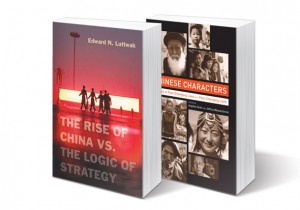
The Rise of China vs. the Logic of Strategy By Edward N. Luttwak, Harvard University Press.
Chinese Characters: Profiles of Fast-Changing Lives in a Fast-Changing LandEditors: Angilee Shah and Jeffrey Wasserstrom, University of California Press.
IN THE THREE DECADES since China opened its doors to the world, there is little indication that the West has grown any closer to understanding the Chinese. This is no surprise. Understanding China has been an elusive goal of the West—with, arguably, little progress—since the Jesuit missions of the 16th century.
Two recent books provide us with very different approaches to this seemingly hopeless task, and with very different results. Edward N. Luttwak’s The Rise of China vs. the Logic of Strategy approaches China from the outside, purely in relation to its neighbors and the West. Meanwhile, Chinese Characters: Profiles of Fast-Changing Lives in a Fast-Changing Land goes inside China. An astonishing anthology of short profiles of “Chinese characters,” edited by Angilee Shah and Jeffrey Wasserstrom, it suggests a population that often regards itself as just as foreign to this new, modern China as those born outside its national borders.
China, in fact, is a place full of outsiders who—due to their ethnicity—have very little claim to belong in the first place. Take Alim, for example, the university student we meet in one of Chinese Characters’ later chapters. Born in China’s far-western Xinjiang province to parents of the Uighur ethnicity, Alim has had the good fortune to be accepted into China’s University of the Minorities, an institution established to benefit the 8 percent of Chinese citizens who are not ethnically Chinese.
For Alim and his family, it’s a one-time shot at modern, Chinese-style upward mobility. Alas, Alim, like so many of the Chinese characters in Chinese Characters, learns that benefiting from China’s upward mobility means accepting China on China’s terms. “We go through school learning nothing about our own culture,” he tells Ananth Krishnan. “We only learn how the Chinese look at us.”
Alienation—linguistic, economic, and historical—is a common complaint in and about contemporary China. It is not exclusive to those eligible for the minority universities. To an extent, this is predictable. Market-based capitalism has been disrupting and fragmenting traditional, agrarian-based societies since the invention of the steam engine. But China, as everyone knows, is different.
To begin, it is bigger and older. Equally important, if not more so, its economic modernization followed 10 years of the Cultural Revolution (1966–1976), during which the objects, works, and people who represented China’s traditional culture were systematically destroyed. What remained was a traumatized people with little more than a tenuous connection to the Confucian (or even Maoist) past. Under such circumstances, the amoral spirit of the free market—profit is good, loss is bad—had little trouble taking root across China. Today, if anything binds the Chinese people together, it is the fading memory of poverty and upheaval that nobody wants to revisit.
Each of the profiles in Chinese Characters touches on this transformation, from a tradition-bound agrarian society to a modern, urbanizing one in search of a moral framework beyond the logic of profit. In the book’s most beautifully written chapter, Michelle Dammon Loyalka describes the life of Zhang Erhua, a migrant laborer who works in a scrapyard in the ancient city of Xi’an.
Zhang’s decision to work in this particular business was driven not so much by the financial rewards, but rather because it employs people from his hometown. He finds himself very much at odds with China’s prevailing money-is-everything ethos, arguing that “too often it gives rise to a petty ruthlessness in which one’s quest for getting ahead is put above moral considerations—including the health, safety, and livelihoods of others.”
This is a sentiment that Edward Luttwak, an American military strategist, historian, and senior associate at the Center for Strategic and International Studies, argues will be China’s ruin. Once the country reaches a point at which its consumption and needs alarm its neighbors, those neighbors and global powers who once tolerated that growth will feel increasingly threatened and will eventually try to curtail it.
Luttwak admits his thesis isn’t grounded in personal experience with China. It’s grounded in “the universal logic of strategy,” which “applies in perfect equality to every culture in every age.” Despite his claims of theoretical purity, Luttwak devotes the first half of his book to an extraordinary, occasionally offensive cultural dissection of the Chinese character that suggests he doesn’t much like China, much less its officials or people.
An analogy he uses to illustrate that point reveals his biases: “Riders in a crowded elevator cabin into which an extremely fat Mr. China has just stepped in must react self-protectively if he is becoming fatter at a rapid rate, squeezing them against the walls—even if he is entirely unthreatening, and indeed affable.” Needless to say, Luttwak’s fat and autistic Mr. China isn’t affable. Rather, he’s arrogant and entirely unsympathetic to those around him.
But is that true? Over the last two decades, some of the greatest beneficiaries of China’s growth have been the nations of Southeast Asia that Luttwak believes are destined for conflict with China. They have also been the beneficiaries of development assistance and other forms of largesse from China. Of course, China doesn’t hand out foreign aid without expecting something in return. But Luttwak fails to consider that one of the things the Chinese Communist Party wants in return is a conflict-free region, where China can continue to lift itself into the ranks of the world’s developed nations.
The logic of strategy (and elevators) may not account for such aspirations, but human beings with a deep and abiding appreciation for the woes of poverty surely do. In Chinese Characters we meet some of those human beings and, perhaps modestly, increase our understanding of China. Edward Luttwak would be well advised to read it.





